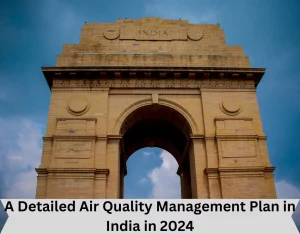ForumIAS announcing GS Foundation Program for UPSC CSE 2025-26 from 19 April. Click Here for more information.
Source: The post need for a detailed air quality management plan in India has been created, based on the article “Why pollution control needs localised data, grounded in science” published in “Indian express” on 20th January 2024.
UPSC Syllabus Topic: GS Paper 3 – Environment – Environmental Pollution and Degradation
A Detailed Air Quality Management Plan in India in 2024, This article discusses India’s challenges with air pollution and proposes a detailed plan. It suggests creating an advanced air quality framework using science, technology, and policy to monitor and manage air pollution more effectively across different regions of India.
Why is There A Need for A detailed Air Quality Management Plan in India?
Severe Air Pollution: Indian cities are grappling with high levels of air pollution, as highlighted during events like COP 28.
For information on COP 28 read here
Mixed Results from Existing Plans: The National Clean Air Action Plan (NCAP) launched in 2019 shows mixed results, indicating the need for more effective strategies.
For information on NCAP read here
Health and Climate Risks: Air pollution in India, caused by fossil fuel combustion, industrial processes, and biofuel burning, poses health risks and contributes to climate change.
Diverse Climatic Conditions: India’s varied micro-environments and climatic conditions make a one-size-fits-all approach ineffective.
Lack of Comprehensive Data: Current efforts are mainly urban-focused, and there’s a lack of systematic emissions inventory and monitoring.
Baseline Pollution Levels: Research by NIAS shows baseline levels of pollutants like PM2.5 are higher than WHO guidelines, emphasizing the need for localized standards.
Here Are More Topics For Your Interest-
Increased Capital Expenditure by Indian states in 2024- States are spending
Recent Concerns with India’s Science Management in 2024
What Has Been Done to Address Air Pollution in India?
Implementation of National Clean Air Action Plan (NCAP): Launched in 2019, the NCAP was India’s major initiative to reduce air pollution levels in its cities.
Establishment of Air Quality Monitoring Networks: Enhanced monitoring systems have been set up in urban areas to regularly track air pollution levels.
Research Initiatives by NIAS: The National Institute of Advanced Studies conducted research to establish baseline levels of major air pollutants in various climatic zones.
Technology Integration for Emission Tracking: In Bengaluru, drone-based artificial intelligence was used for the first time to identify emission hotspots, a step towards precise pollution source identification.
Policy Formulation at Urban Levels: Focused efforts on analyzing and managing air pollution in urban areas, acknowledging the severity of pollution in these regions.
15th Finance Commission Funding: Allocated funds to states specifically for air quality management, encouraging state-level initiatives and actions.
What Should Be Done to Address Air Pollution?
Strengthen Key Input Parameters: Before developing an air quality early warning system, focus on reinforcing two critical aspects: creating a detailed inventory of emissions and conducting comprehensive air-shed mapping. This foundational work is essential for accurate forecasting and effective management of air quality.
Tailor Strategies to Diverse Environments: Address air quality in rural, urban, and industrial areas with strategies specific to each region’s climatic conditions.
Incorporate Advanced Technology: Incorporate Advanced Technology entails using innovative tools in air pollution management. This includes drone-based AI for pinpointing emission hotspots, as demonstrated in Bengaluru, and CubeSats, small satellites offering detailed environmental monitoring, crucial for air quality analysis in India.
Expert Collaboration: Form a consortium of domain experts, health scientists, and policy specialists for integrated air quality management.
Question for practice:
Discuss the actions that have been taken in India to address air pollution and elaborate on the proposed strategies to further tackle this issue.





